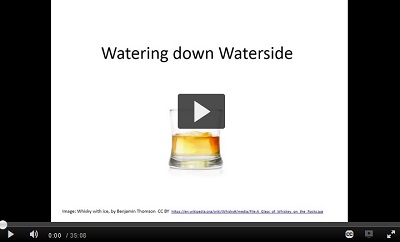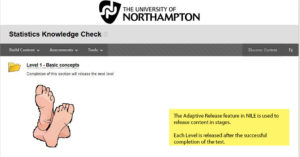Undergraduates on the Film and Screen Studies degree course are now enjoying seminars and screenings at the Errol Flynn Filmhouse, in Northampton, allowing them to see movies as directors intended – on the giant screen.
“This is an exciting opportunity for students, enabling them to study films within the environment of their reception, while also providing them with an invaluable insight into industry practices,” said Dr Michael Starr, Lecturer in Film and Screen Studies.
Watch the film here: Errol Flynn Cinema screenings for UN students as part of Film and Screen Studies Lectures
Source: University of Northampton. 2015. University of Northampton students get their lecture kicks at the flicks. [ONLINE] Available at: http://www.northampton.ac.uk/news/university-of-northampton-students-get-their-lecture-kicks-at-the-flicks. [Accessed 30 November 15].
[Posted on behalf of Elizabeth Palmer]
When starting to make online activities for blended learning there is a temptation to take content that is currently being delivered face-to-face in lectures (through software such as Powerpoint) and moving that content into an online format where the students are ‘digitally page turning’ through material: read or watch x, y and z before class.
The learning and teaching plan for blended learning is that we are creating interactive activities that support students towards developing their own knowledge, understanding and creating outputs that can then be used in class. In other words we are trying to flip the focus away from tutor created content that the student must passively absorb, to student-led interactive and created content.
Any content provided to students should be done in an interactive, discovery based way i.e. rather than telling them the answer we allow them to discover the answer through questioning, testing, trialling, problem solving etc. online and then reinforce and develop this face to face. If you are trying out e-tivities for the first time Xerte can be a useful package to start this process. Have a look at these two examples of using Xerte to make interactive activities on academic skills: here and here. Whilst they are not necessarily perfect, they demonstrate how you can use Xerte’s functionality to create knowledge checking, interactive exercises that you could then build on in class or use as a basis for students to undertake a more complex task.
The following presentation by Dr. Rachel Maunder entitled “Watering down Waterside” provides a summary of a similar presentation delivered at the School of Social Sciences Learning and Teaching event in February 2016.
Incorporating the Institute of Learning and Teaching’s (ILT) Direction of Travel video, the presentation provides advice and strategies for programme teams when thinking about the design of their modules and programmes for delivery now, and in preparation for Waterside, linking the use of NILE and the NILE benchmarks, describing blended learning and flipped learning approaches (with examples such as the module PSY1006 – Becoming a Psychologist), and introducing elements of the CAIeRO process.
At the recent Sharing Higher Education Design (S.H.E.D.) roadshow week in Science and Technology, the Learning Design team were introduced to a number of examples of good practice, including the hugely successful open educational resources (OERs) that have been published by staff in the School. These resources – some of which have had hits in the thousands – are publicly available, benefiting not just our students but learners around the world who are looking to further their understanding.
To find about more about these resources, visit the Learning and Teaching blog from the School.
Watch this space for more case studies from the S.H.E.D!
The Geography+ project aims to support the development of employability skills in students studying in levels 4 and 5 of the Geography programme. It is currently running as an extra-curricular ‘module’ led by Faith Tucker, with support from staff in the discipline and staff from the Changemaker hub.
For more detail about Geography+, have a look at the overview:
In 2013 the Nominet Trust launched the Social Tech Guide. The aim of the guide is to promote and celebrate inspiring uses of technology for social good. Each year they publish the Nominet Trust 100, a guide to the 100 best digital technologies for social innovation. The 2015 guide has just been published and features a wide variety of technologies, from Flowy, a game to help people combat panic attacks, to MOM, an inflatable incubator for use with premature babies in the developing world, to WREX, a robotic exoskeleton to help children with neuromuscular diseases.
You can find out more and view the guide here: http://socialtech.org.uk/
Between Saturday 19th December 10:30pm GMT and Sunday 20th December 10:30am GMT , NILE will be upgraded to the latest stable version. It will be unavailable between these times.
Northampton is currently on Blackboard April 2014 and will be upgraded to the October 2014 release. This version jumps one release above our current point and will ensure that we remain within contracted support. There are no new significant features but there will be security updates.
All users of NILE should ensure that browsers are updated to keep within the supported levels.
Whilst during the academic year security fixes are applied, annually we need to ensure that NILE is at the most stable version with the latest features to benefit staff and students. Our hosting contract provides us with at least 99.9% availability for NILE 365 days a year providing we ensure that we maintain our version.
The new version contains security updates to ensure that NILE is maintained as an advanced virtual learning environment to maximise the student experience.
Please contact Rob.Howe@nothampton.ac.uk if there are any comments or questions around the upgrade process.
[Posted on behalf of Anne Misselbrook – Content Developer]
Dr Michael Curran PhD, MBA, MPhil is an Associate Professor (Podiatry) and module leader for research methods in Podiatry at the University of Northampton.
One of the research methods modules taught over three years of the BSc Hons Podiatry course is inferential statistics. Mike was keen to increase the blend of this material between face to face delivery and online activity, and this resulted in the Statistics Knowledge Check. He has completed the cycle of transferring content online and students provided feedback using a survey included in the Statistics Knowledge Check.
One of the Podiatry students noted:
“I found tackling the Knowledge Check in 4 separate stages hugely useful and much more manageable than being exposed to a larger test. I found the separate stages less intimidating”.
Dr Curran reflected on the experience:
“It is interesting to me how to blend the concept of e packages with actual face to face teaching. I guess it is the future.
On reflection I think we have hit the middle ground of evaluation with no very favourable student comment, but equally no very unfavourable comment. Considering this is teaching statistics that is probably pretty good!!
My reason for doing this is to try and look at alternative ways of delivering a potentially dry subject, with ability for the students to reflect on the statistics at a future date.
I would consider repeating this approach for other areas of my teaching”.
To read the full blog article please click here. Using an online Gamification approach to teaching inferential statistics
To find out how to use the Adaptive Release feature in NILE please click on the link here
Learn more from Blackboard Help click here
 Hypothesis is browser based annotator which runs in Chrome and Firefox browsers.
Hypothesis is browser based annotator which runs in Chrome and Firefox browsers.
It is excellent as:
- A personal web annotation tool
- A group annotation tool
- A peer feedback tool*
Groups are easily created and can be named freely as each group has a unique ID to avoid common names being used up!
*Before getting over-excited, I should caution that Hypothesis really only works on pages (or PDF files) that are not protected by a login, which will reduce the number of scenarios it might be deployed in. However, sharing PDF or image files through an ‘Anyone with the link can read’ type permission is reasonably secure and very, very unlikely to to picked up by Google as a search result. There’s also no moderation, so peer review needs to be limited to individuals who can engage with the process sensibly. NILE does allow us to create a mechanism to control the deployment of annotation links through groups and adaptive release.
It’s also possible to collect page annotations together through an RSS feed or your own Hyphothesis account – if these are printed to a PDF, this could be used as part of a portfolio of evidence or assignment.
There are some very useful educator resources on the Hypothesis web site and more information (including a short video demo) on the NILEX site.
Dr. Stuart Allen recently redesigned his level seven epidemiology module in order to add some pre-class blended/distance learning elements into it.
You can find out what worked well (and what didn’t work so well) in this audio interview with Dr. Rachel Maxwell: http://www.kaltura.com/tiny/nrimm
Recent Posts
- Blackboard Upgrade – March 2026
- Blackboard Upgrade – February 2026
- Blackboard Upgrade – January 2026
- Spotlight on Excellence: Bringing AI Conversations into Management Learning
- Blackboard Upgrade – December 2025
- Preparing for your Physiotherapy Apprenticeship Programme (PREP-PAP) by Fiona Barrett and Anna Smith
- Blackboard Upgrade – November 2025
- Fix Your Content Day 2025
- Blackboard Upgrade – October 2025
- Blackboard Upgrade – September 2025
Tags
ABL Practitioner Stories Academic Skills Accessibility Active Blended Learning (ABL) ADE AI Artificial Intelligence Assessment Design Assessment Tools Blackboard Blackboard Learn Blackboard Upgrade Blended Learning Blogs CAIeRO Collaborate Collaboration Distance Learning Feedback FHES Flipped Learning iNorthampton iPad Kaltura Learner Experience MALT Mobile Newsletter NILE NILE Ultra Outside the box Panopto Presentations Quality Reflection SHED Submitting and Grading Electronically (SaGE) Turnitin Ultra Ultra Upgrade Update Updates Video Waterside XerteArchives
Site Admin





